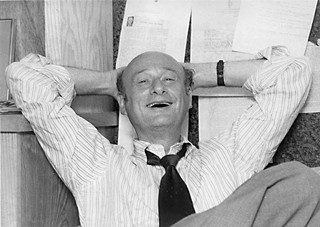How'd He Do?
AFS Doc Nights: 'Koch'
By Anne S. Lewis, Fri., Feb. 8, 2013
Ed Koch died last week, just as the film Koch was opening in New York City. Who could forget the Big Apple's feisty, polarizing, but way popular three-term mayor, who took the city reins when it was on its fiscal knees – recall the famous New York Daily News headline: "Ford to City: Drop Dead" – and somehow eased it back onto its feet? Still plucky, unfiltered, and mostly unchastened until he passed at 88, Koch, a New Yorker's New Yorker, plucked straight from central casting, vowed back in 1978 to be the city's first four-term mayor, and he famously walked the streets asking passing constituents, "How'm I doin'?" For three terms, he tangled with many of the city's complex, often unsolvable, and hopelessly divisive problems. In the end, he fell one term short of his goal when, following a municipal corruption scandal, he was unseated by David Dinkins, the city's first black mayor.
In Koch, first-time filmmaker Neil Barsky – a former reporter, Wall Street analyst, and hedge fund manager – takes us, talking-head and TV news-style, through some of the more memorable of Koch's metro donnybrooks, bookending the past with fly-on-the-wall, day-in-the-life scenes of Koch before he died. (He seemed to be "doin'" pretty well, for the most part, right up to the end.) While Barsky's film might seem a bit "inside baseball" for those who either don't remember or don't care about NYC politics, the screen time up close and personal with Koch-the-character is definitely worth the price of admission.
Koch came to office after three terms in Congress, vanquishing a formidable lineup of primary challengers, including Mario Cuomo and Bella Abzug. A Democrat who was also one of the first fiscal conservatives slash social liberals, Koch took office at a low point for the city, when crime – remember the Son of Sam? – and poverty rates were high and race relations tense. There was also that infamous blackout of 1977. And the beginning of the AIDS crisis.
Reconstructing the Koch administration years with talking heads and archival footage, Barsky revisits some of the more emotionally charged segments of the past, including the mayor's travails with the city's African-American population, a group with whom he seemed to repeatedly lock horns. On film, Koch concedes – if only qualifiedly – that he made a mistake when, in his first term, he closed the Sydenham Hospital, a Harlem institution that employed many African-American doctors. He adds, in signature Koch apology-nullifying style, that he could have avoided the problem and the resulting political maelstrom, if only he'd given into the same terror that his three predecessors had.
Barsky spent time with the mayor in his final years at his Fifth Avenue apartment – where he lived alone. Koch never married, and the issue of his sexuality – a topic he had steadfastly maintained was none of anyone's damn business – had dogged him since his initial 1977 primary fight with Mario Cuomo. At that time, fliers reading, "Vote for Cuomo, Not the Homo" were distributed anonymously (some suspected Cuomo's son Andrew was involved, though he's always denied the charge). A decision was made during that campaign to counter these insinuations by "pairing" Koch with former Miss America Bess Myerson, who appeared at his side at most public occasions.
The end of the film takes us to a 2010 ceremony at which a delighted Koch was honored by the current Hizzoner, Michael Bloomberg, who announced the renaming of the 59th Street Bridge as the Ed Koch Queensboro Bridge. Given the timing of Koch's death, one of the film's most telling scenes is now one of the most poignant, the one where Koch examines – on-site – the cemetery stone he himself designed.
AFS Doc Nights presents Koch on Wednesday, Feb. 13, 7pm, at the Alamo Drafthouse Village; see www.austinfilm.org/film-koch for ticket info.









